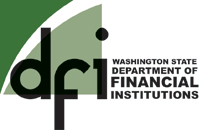
Summer 2019 Newsletter
Legislative Update
The 2019 legislative session adjourned April 28, 2019. 2,762 bills were introduced during the 105 days the 2019 legislature was in session. Of these, 484 were signed into law.
Legislation passed and signed by the governor is effective 90 days after the end of session (July 28) unless otherwise noted.
Bills that may affect DFI’s licensees follow:
SHB 1071 Protecting Personal Information (CL 241 L 19)
Amends chapter 19.255 RCW by expanding the definition of "personal information". The definition of personal information was expanded to include military, student or passport numbers; health insurance policy numbers; personal health information; and biometric identifiers. Requires certain additional information to be provided in a data breach notice to affected consumers and to the Attorney General. Authorizes additional methods of providing a data breach notice to affected consumers. Shortens the period of time to provide notice to affected consumers and the Attorney General from 45 days to 30 days.
SSB 5278 Concerning Reporting Suspected Fraud and Theft of Payment Cards (CL 186 L 19)
The bill directs financial institutions to list a phone number for cardholders and merchants to report suspected incidents in which payment cards are used fraudulently or have been stolen. Requires financial institutions to have employees or contractors available during business hours to receive phone calls and provide assistance to cardholders that suspect fraud or that their cards have been stolen.
SB 5638 Recognizing the Validity of Distributed Ledger Technology (C 153 L 19)
Provides that an electronic record may not be denied legal effect or enforceability solely because it is generated or stored using distributed ledger technology. "Blockchain" means a cryptographically secured, chronological, and decentralized consensus ledger or consensus database maintained via internet, peer-to-peer network, or other similar interaction. "Distributed ledger technology" means any distributed ledger protocol and supporting infrastructure, including blockchain, that uses a distributed, decentralized, shared, and replicated ledger. "Electronic record" means a record generated, communicated, received, or stored by electronic means for use in an information system or for transmission from one information system to another.

 We Want Newsletter Feedback:
We Want Newsletter Feedback: